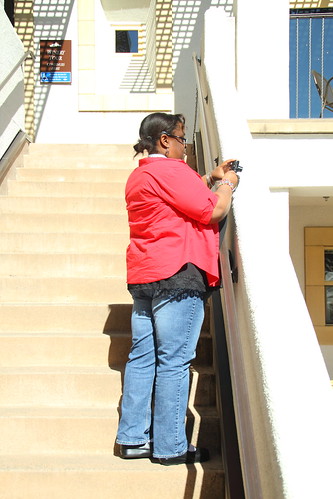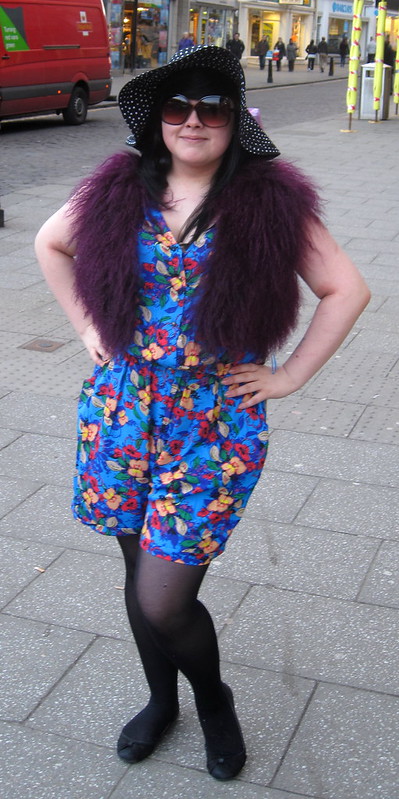I appreciate the way writing allows me to delve more deeply into certain subjects. Once again, this is supposed to be The Weekend Word, but lately, whatever. It’s Wednesday. The Wednesday Word it is. This time, I’m thinking about Othering within the context of a few things that have happened in my life lately. Please note that I’m not teaching, here, but am writing through this in an attempt to explain the issue to myself so that I, who allegedly want to write about and embrace diversity, can write about it and embrace it both more subtly and more effectively.
Sooo, this Black History Month has been interesting – I have had three very different experiences with responses in my community. After Martin Luther King, Jr’s birthday, a woman of color approached me after a musical program I took part in with a Caucasian friend, and held forth on how inappropriate it was for us to talk about MLK, Jr’s favorite music, and it wasn’t my fault, because I was young, but I didn’t know anything, and how inappropriate it was for Caucasians to tell “her story.” You know how it is when someone older than you speaks, and they’re on a tear? You just listen. Nobody asked you to speak, you’re an ear, for the conversation – I know you’ve had those experiences before.

The other experience was working with a Caucasian person who referred to slavery in her talks during Black History Month. She frequently repeated the phrase, “those people,” as in, “Put yourself in the place of those people, and understand the privations they experienced! And yet, they went forth and did these things. Those people suffered. Those people died…”
The third experience was of a young Asian American teacher talking about her experiences in China among the leper colonies – a place she never intended to go, but a place she has been changed and challenged by visiting. She was talking about the lessons that she learned from the people there. She showed pictures of the people with whom she worked – it was a fairly intense and, at times, disturbing presentation. She was not soliciting funds or volunteers, but just sharing her experience with the colony, the country, and the people.
Maya Angelou is quoted as saying, “I’ve learned that people will forget what you said, people will forget what you did, but people will never forget how you made them feel.” Good grief does the “how” matter in this world. How we tell our story – and what we define as ours seems to be based in how we identify ourselves.
I must admit that I’m kind of “meh” on Black History Month; teachers of color often are. There’s an irony just waiting to be voiced – the shortest month of the year for talks on “tolerance” and forced exercises in African American appreciation. It’s… sometimes distasteful. It feels staged, boring, blah. It feels like one month a year, people are making a big fuss over something that happened two hundred years ago (slavery), and corporately and individually ignoring that time during the rest of the year, as if it’s a single episode floating untethered from history. Now, I know many, many teachers try and make it vivid and lively for our children and young adults, but obviously, you can’t embrace diversity if appreciation of differences and background happen a.)half-hardheartedly, b.) with an eye only to North America and c.) consisting of historical, non-contemporary input, and d.) only once a year.
That being said: I didn’t feel my Caucasian colleague and I did badly in talking about Martin Luther King, Jr. I apparently don’t identify strongly enough as a Civil Rights person to feel that someone getting details wrong was making a hash of “my” story – and that may largely because I am not political, nor am I old enough to have been alive or aware in the sixties and early seventies when most of the Equal Rights Amendment and Civil Rights stuff was going on. (I won’t even go into the indictment that “you’re too young” is — no.) More important, though, was the fact that this person clearly delineated to me that there was an “us” and there was a “them” and “they” were messing up “her” tale. Not only was I awkwardly caught in the middle, I was frustrated. Educated, professional people are supposed to be past all that… aren’t they? Obviously, no.

The second experience was more difficult – because it was so well meant, yet so obviously wrong. It overlaps a bit with the third experience for me. To be blunt, people of other cultures are not here to teach you things. I mean, unless they’re teachers, duh. But, they’ve not been put on earth for you to learn “lessons” of simplicity or grace or steadfastness or — really, anything. So, when my colleague talked about the African slaves, and how they suffered, and how we could take the idea of their suffering and perseverance and apply it to our own lives… She meant well. She meant so well. But, no.
French philosopher Michael Foucault defined our Word: “Othering is strongly connected with power and knowledge. When we ‘other’ another group, we point out their perceived weakness to make ourselves look stronger or better.” From Othering 101: “…any action by which an individual or group becomes mentally classified in somebody’s mind as “not one of us”. Rather than always remembering that every person is a complex bundle of emotions, ideas, motivations, reflexes, priorities, and many other subtle aspects, it’s sometimes easier to dismiss them as being in some way less human, and less worthy of respect and dignity, than we are.” Author Arjuna Ardagh: “OTHER” |ˈəðər| verb 1. to attribute qualities onto another person, often a celebrity in the news, so as to avoid acknowledging these same qualities within oneself:
[as verb. ] hey, don’t other Clinton, most married men have done stuff like that | I went to a meeting with the Dalai Lama. It was great but people tend to other him by putting him above them.”
So, here you have three ways to look at it – staging yourself as Hero and another person as Victim, staging yourself as insignificant, and another person as Awesome, or ascribing stereotypical attributes to another group. To be honest, I don’t think my colleague was at all trying to rob people of dignity — but in repeating “these people,” as if they were somehow not people like her, she underscored the idea that she didn’t think of them as people like her. See, for me, the horror of slavery becomes that much more central when you fail to divorce yourself from either side of it. When we don’t recuse ourselves from the brutality and the mindless boredom, the depravity and the insanity, really – you cannot speak of it as if it happened to someone else, but you either speak less – which would be a good option, overall- and think more, or you speak more carefully, more thoughtfully.
Writing my last manuscript, I had an instance when an elderly woman was injured. Previously, I had her injured while her home was ransacked for prescription drugs. I mentioned this to Tech Boy, and he… paused.
I have come to know that pause.
“How often does that actually happen?” he asked.
“Uh, it happens,” I assured him. “She doesn’t live in a nice area, she lives in a trailer park, actually, and –“
“Y’know, statistically, that’s probably happened to, like, ten people in the entire United States? But it’s one of those crimes talked about as aggressions from young African American males against Caucasian seniors. It’s one of those trigger-point kinds of inflated statistics that politicians use to make older Caucasians feel vulnerable – and more likely to vote for them. It’s… um… actually, racist. And, when you write stuff like that, you’re, uh, perpetuating racism – Don’t hit me!“
No, I didn’t hit him.
I looked.
Recent confirmed news stories have tons of prescription theft stories in them… but they take place between tractor trailers, pharmacies, and warehouses. They involve doctors, technicians, medical stores, and patient relatives. Not one story about little old ladies being murdered in their beds, and their heart meds stolen. Not one.
THIS IS NOT TO SAY THAT IT DOES NOT HAPPEN. Seriously, lambs, don’t come at me with that. I know – it happens to people, you have specific, individual people you know personally to whom it happened. Yes. Okay. Please don’t think I’m trying to take that away from you. But! This crime happens NOT in the numbers that the pass-it-along-via-email, anti-Snopes (I ♥ Snopes! Debunks urban legend, every time) crowd would have us believe. Not in the “Oh, dangerous world!” levels that politicians might apply to make us unseat an incumbent. As always, I owe Tech Boy for his input – he’s a great behind-the-scenes reader and commenter (which is why I’m totally outing him lately), but it just pinged my conscience to imagine what other discrepancies I had passed on, because the Other is so clearly foreign to me – those drug-stealing thugs. They’re not like me – they’re monsters, preying on the poor. They’re not me, they’re y’all. I’m better than that, and I can cross the street when I see someone who might be one of Them.
I so appreciate the correction and realignment of my thoughts, but ouch.
Which dovetails nicely into my third experience. This was an Asian American woman sharing experiences from being in Asia. Surely, she wasn’t Othering anyone, right? Perhaps – but, inasmuch as I thought I wasn’t Othering potential African American drug thieves, even when it’s “your own” it’s possible to misconstrue. Though she was talking about how much she had changed, through her time in China, and how selfish she learned she was, when seeing people with so much less, I am always hesitant when a person infers that they have learned “lessons.” When people don’t treat you as a human being but as a person belonging to a certain group, and then apply their own prejudices and stereotypes about that group to you and then extrapolate what “lessons” they learn from the challenging of those prejudices and stereotypes — well, it’s like having a whole conversation about you, with you in the room, and never speaking to you. It’s like conversing, but being a single person holding up both ends of the conversation. You know how people anthropomorphize their pets, putting human concerns and human words into the mouths of cats, dogs, and wild animals? It’s like that, almost. It’s making of rational human beings a sort of Human Zoo.
I honestly don’t know where I am going with all of this, except to illustrate how easy it is for GOOD, WELL-MEANING PEOPLE – people like you and me, us, even y’all – to take for granted who we are, and who we perceive others to be, relative to our identity. It’s easy, to, even in a well-meaning way, misidentify who surrounds us, and place ourselves above or below them mentally, away and apart from them emotionally. And yet, if we’re to embrace our diversity and strengthen who we are… we’ve got to do better. Period.
This one is going to take some work.
As always, thanks for thinking with me.





